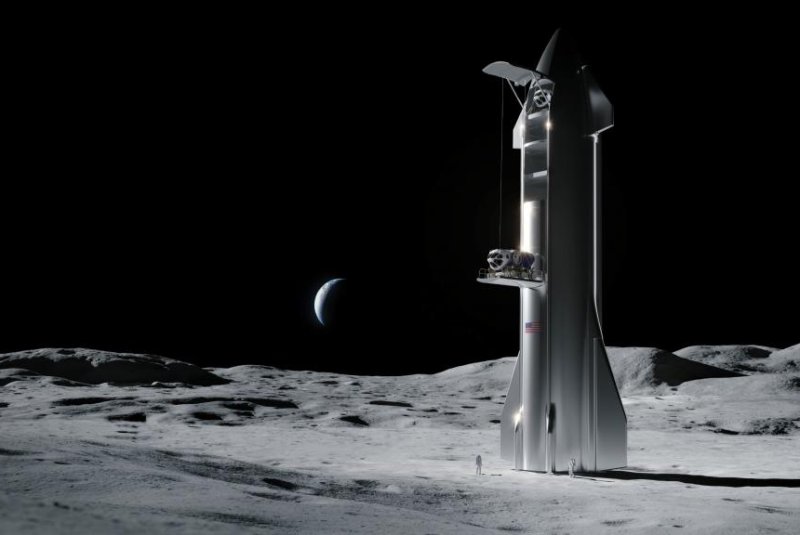SpaceX was one of the five companies selected to join NASA's Commercial Lunar Payload Services program. The company and its lunar lander Starship will compete to deliver heavy scientific and technology payloads to the moon's surface as part of the space agency's Artemis program. Photo by NASA/SpaceX
Nov. 19 (UPI) -- NASA has announced the addition of five new companies eligible to bid for the contracts for the space agency's Commercial Lunar Payload Services program.
SpaceX, Blue Origin, Ceres Robotics, Sierra Nevada Corp. and Tyvak Nano-Satellite Systems are all working to design and build lunar landers capable of delivering science and technology payloads, including rovers and science experiments, to the moon's surface.
The five new companies will compete for contracts with nine previously announced CLPS vendors, including Astrobotic Technology, Deep Space Systems, Draper Laboratory, Firefly Aerospace, Intuitive Machines, Lockheed Martin Space, Masten Space Systems, Moon Express and OrbitBeyond.
"The intent is to broaden the pool to bring on companies with different capabilities and new, innovative ideas," Steve Clarke, deputy associate administrator for exploration in NASA's Science Mission Directorate at NASA Headquarters, told reporters during a press call on Monday.
All 14 of the companies participating in the CLPS program will be bidding to service missions related to the Artemis program, NASA's mission to return humans to the moon by 2024.
The space agency has awarded contracts to send as many as 14 NASA-provided science and technology payloads to the lunar surface by 2021. NASA expects to issue more payload delivery orders soon.
"I would like to build up a schedule of at least two deliveries per year," Clarke said.
One of those deliveries will involve VIPER, the agency's Volatiles Investigating Polar Exploration Rover. The rover is being designed to hunt for water ice on the moon's south pole.
NASA doesn't want to send astronauts to put down a flag and collect rocks; the space agency aims to establish a permanent lunar base, an outpost that can support deep space travel. To do so -- and to make getting to and landing on the moon easier -- NASA plans to use a variety of scientific payloads to better understand the resources available on the moon. If NASA can locate accessible water on the moon, it could be used not only to drink and irrigate crops, but also to produce oxygen and fuel.
SpaceX, Blue Origin and the Sierra Nevada Corp. have partnered with NASA on missions before.
All of the newest CLPS participants were selected because they promised to be able to deliver heavier payloads than the previous nine companies.
"We have a need and saw a need to bring on some additional providers that had enhanced lander capabilities," Clarke said. "This is based on our objectives -- the agency's objectives -- to get to the moon as soon as possible, both from a scientific standpoint and from a human exploration standpoint."
SpaceX said its delivery services provide plenty of giddy-up to meet NASA's needs.
"With Starship, we can bring about 100 metric tons to the moon and return more," SpaceX president Gwynne Shotwell said.
Starship is being designed to both land on and launch from the moon.
Not all of the companies announced Monday were household names.
"There are also small players, and we are one of those," said Michael Sims, CEO and founder of Ceres Robotics. "They bring an agility and creativity that adds to the mix and contributes in very substantial ways."
By involving a variety of companies, both big and small, in the CLPS program and Artemis mission, NASA hopes to provide another boost the burgeoning private space industry.
Clarke says he and his colleagues at NASA hope the space agency will be one of many customers for each of their commercial partners.
"That's what is going to be very exciting about this," he said.















